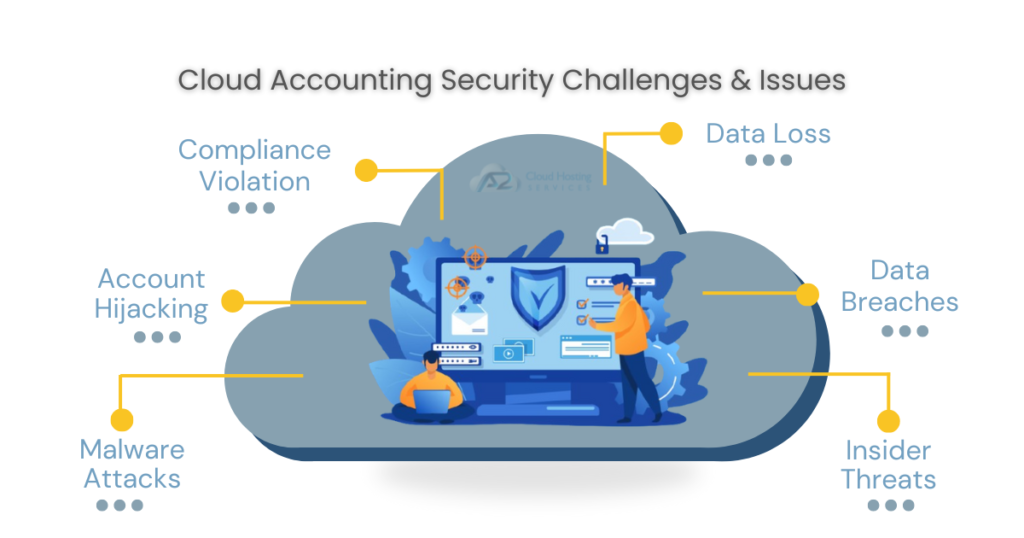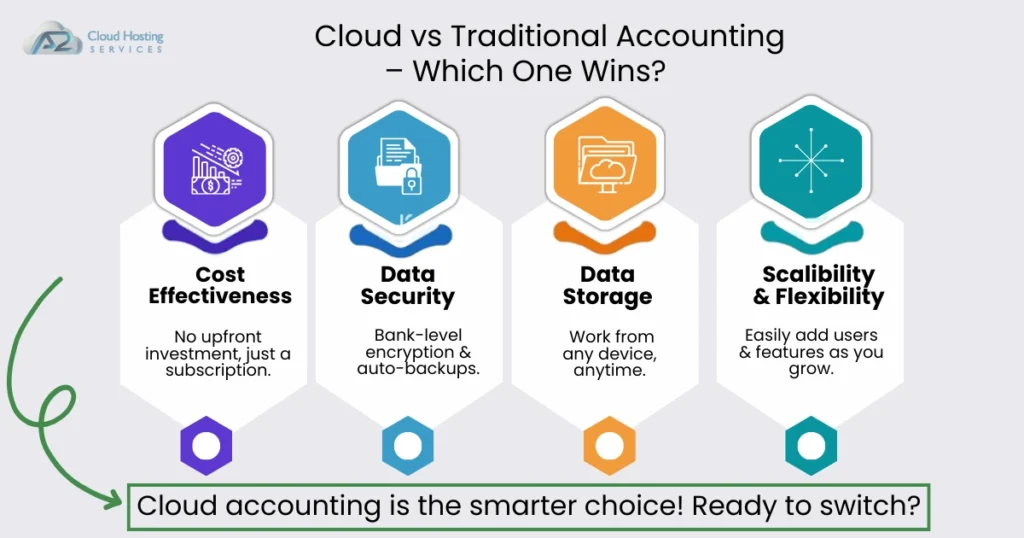In today’s digitizing world at a fast rate, more businesses of all sizes now embrace cloud computing to streamline the operations of any business. Especially, cloud accounting has transformed business finance management: it offers ultimate flexibility, scalability, and access. However, this revolutionary technology also brings distinct security challenges that require careful consideration and rigorous mitigation strategies.
This blog post will be an in-depth study of the cloud accounting security system, its important aspects, threat identification, and best practices for securing sensitive financial informations.
Understanding Cloud Accounting
Cloud accounting describes the usage of cloud-based software and platforms to manage accounting in several functions such as the following:
- Generation and Processing of Invoices: Smoothing the flow of invoicing, payments, and collections.
- Financial Reporting: Preparation of correct and timely financial statements like the income statement, balance sheet, and cash flow statement while ensuring cloud accounting security for accurate and protected financial data.
- Bank Reconciliations: Automatic bank reconciliation with a statement by a bank to match with an account’s recording; and the tracking and managing of business expenses including travel, meals, and entertainment.
- Payroll Processing: Maintaining employee payroll, including tax calculations and direct deposits.
- Inventory management: Monitoring inventory levels, tracking stock movements, and managing purchase orders.
The Benefits of Cloud Accounting
Cloud accounting has several benefits for businesses:
- Accessibility: Access financial data at any time, from anywhere, using any device connected to the internet.
- Collaboration: Allow easy collaboration among team members, clients, and accountants.
- Efficiency: Automate routine tasks, freeing up valuable time for more strategic activities.
- Cost savings: Lower IT infrastructure costs, no expensive on-premise software and hardware, while ensuring cloud accounting security for safe and reliable financial management.
- Improved Scalability: Scale resources up or down as needed to change business needs easily.
- Improved Data Security: The robust security measures are provided by the best cloud providers in USA such as data encryption and disaster recovery.

Top 6 Cloud Accounting Security Issues
While cloud computing has numerous benefits, it also brings with it several security issues:
- Data Breaches: They access financial data of a sensitive kind, such as customer information, bank details, and trade secrets without authorization.
- Data Loss: Sometimes, due to some accident or malice, critical financial data gets deleted from the system which may result in a stop to business activities.
- Account Hijacking: Access of unauthorized people into the user’s account that may manipulate financial transactions or steal sensitive information.
- Malware Attacks: This may infect your cloud-based system and cause data breaches along with disrupting the system.
- Insider Threats: Employees and other insiders who act maliciously or negligently can be great security risks.
- Compliance Violation: Noncompliance with various data privacy laws and regulations, like GDPR and CCPA, attracts huge fines along with reputation loss.
Key Cloud Accounting Security Measures
These risks are only minimized through business actions:
- Robust passwords and MFA: Businesses must implement robust passwords, and use strong multi-factor authentication like 2FA, etc. in the account to strengthen it.
- Periodic updates: Use of the latest security patches should be applied in the cloud accounting software as well as in operating systems
- Encryption: The data is protected through encryption against unauthorized access. The data has to be encrypted at rest and while in motion.
- Access controls: Implement detailed controls by restricting access to sensitive data based on the role and responsibility of the user.
- Regular security audits and penetration testing: Penetration tests must be carried out regularly to identify vulnerabilities and correct them.
- Employee education: Educate them about security best practices, from phishing scams and social engineering attacks to importance at all levels of security
- Disaster Recovery Business Continuity: Design the proper disaster recovery plan to sustain the business in any given security threat situation
- Compliance with data-privacy regulations: Ensures a particular data privacy regulation, say GDPR and CCPA compliance, helps the organization evade risks of reputation damage and liabilities.

Cloud Accounting vs Traditional Accounting Software
Advantages of cloud accounting software over on-premise systems:
- Cloud accounting solutions provide access to real-time data from any location with an internet connection, thus facilitating collaboration and quicker decision-making.
- Most cloud accounting solutions have features like automated bank feeds, invoice generation, and expense tracking, thus streamlining the accounting process and reducing manual data entry.
- Cloud services take care of software updates and security, eliminating the burden on businesses to focus on IT issues.
- Although legacy software can accommodate more customization requirements, cloud-based accounting is overall more cost-friendly and scalable, regardless of size.
Cloud Accounting Security Best Practices
- Choose a trustworthy cloud provider: Choose a cloud provider with an excellent security and compliance record.
- Conduct due diligence in detail: Evaluate the security controls employed by the cloud provider before finalizing a selection.
- Use security features provided by the cloud provider: Use security features that are offered by the cloud provider such as firewalls, intrusion detection systems, and DLP tools.
- Implement Access controls: Access must be robust with controls, like, access to the most sensitive information based on their roles and job descriptions, hence through the implementation of role-based access control while monitoring users for odd behavior revealing possible security violations.
- Carry out periodic security auditing: Discover any vulnerabilities and these weaknesses need to be corrected and mitigated accordingly.
- Stay updated: One should acquire up-to-date information relating to emerging security risks that can be well countered in the organization.
Emerging Cloud Security Trends: Looking Ahead
The cloud security landscape is constantly evolving due to factors such as the uptake of cloud services, sophisticated cyber threats, and new technologies. Some of the trends that are changing the future face of cloud security include:
- AI/ML-Powered Security: Artifical intelligence and Machine Learning algorithms transform threat detection and response, analyzing enormous volumes of data to flag anomalies, predict potential attacks, and automate security responses; this will enable organizations to anticipate the threats and take proactive steps to minimize breaches.
- Zero Trust Security: The traditional perimeter-based security model is increasingly inadequate in the cloud. Zero Trust security principles emphasize continuous verification and least privilege access, assuming no one or device within the network is inherently trustworthy. This approach enhances security by enforcing granular access controls and minimizing the blast radius of potential attacks.
- Cloud-Native Security Posture Management (CSPM): With the increasing use of cloud-native technologies, the importance of CSPM solutions increases. These solutions provide complete visibility into cloud environments, automate security checks, and help organizations stay compliant with security regulations and best practices.
- DevSecOps: Security is to be integrated into the SDLC for building secure cloud applications. DevSecOps practices focus on collaboration between development, operations, and security teams to ensure that security considerations are embedded throughout the entire development process, from design and coding to deployment and maintenance.
- Multi-Cloud Security: As organizations increasingly take a multi-cloud approach, security across multiple cloud providers poses significant challenges. What is needed for all this to be effectively secured is consistent security policies, centralized visibility, and automated orchestration.
These trends call for proactive, holistic, and innovative approaches to cloud security, embracing new technologies and best practices, by which critical data and applications can be protected in the dynamic and evolving cloud environment.
The Role of A2 Cloud Hosting Services in Cloud Accounting Security
A2 Cloud Hosting Services is a leading cloud hosting provider, and its services are capable of adding security to the cloud accounting solution:
- Turbo Server Technology: The Turbo Server technology from A2Cloud Hosting Services is geared to deliver a high-speed, performance-based product. This can perhaps reduce the vulnerability of DDoS attacks as well as other cyber attacks.
- Enhanced Security Option: A2 Cloud Hosting Services provides extensive security options from DDoS protection, malware scans, and more to secure all your cloud resources.
- 24/7 Support: A2 Cloud Hosting Services has a 24/7/365 expert help desk for all technical and security questions and issues encountered.
- Data Centers: Our data centers use the most secure physical security along with fire suppression systems and power supplies.
Conclusion
Cloud accounting in the financial context brings about distinct security challenges as it demands an individual to place great consideration, and then adopt strong methods of mitigation so that sensitive finance information is assured to be maintained securely.
When businesses implement a few of these security measures offered in this article for safeguarding all sensitive financial information, they continue keeping their cloud-based accounting initiatives viable.
As the landscape of cloud computing continues to shift, it becomes very important that business organizations update themselves on emerging threats and, accordingly, evolve their security strategies. For expert guidance, you can reach us through our chat box or Contact us at (855)-738-0359 for cloud and hosting services.
Frequently Asked Questions
What are the most significant security risks in cloud accounting?
Big security threats related to cloud accounting include data breaches, data loss, hijacked accounts, malware attacks, inside threats, and compliance violations
How can businesses protect their cloud accounting data?
Businesses must protect their data in the cloud by having stringent passwords and multifactor authentication as well as continuously updating their software, encryptions of information, access control, conducting proper security audits frequently, and staff education on best practice security.
What is the role of cloud providers in cloud accounting security?
Robust security measures of cloud providers in cloud accounting, such as data encryption, firewalls, and intrusion detection systems, also prevent unauthorized access to one’s data and cloud accounting accounts
How A2 Cloud Hosting Services could boost the security of cloud accounting services?
A2 Cloud Hosting Services will help in increasing cloud accounting security through turbo server technology, improved security options, 24/7/365 support, and secure data centers

Brown Lopez is a Cloud Engineer and technical writer based in Austin, USA, who enjoys turning complex cloud ideas into clear, simple insights. With solid experience in cloud architecture and real-world projects, he loves creating practical content that helps professionals understand, build, and improve their cloud solutions with confidence.